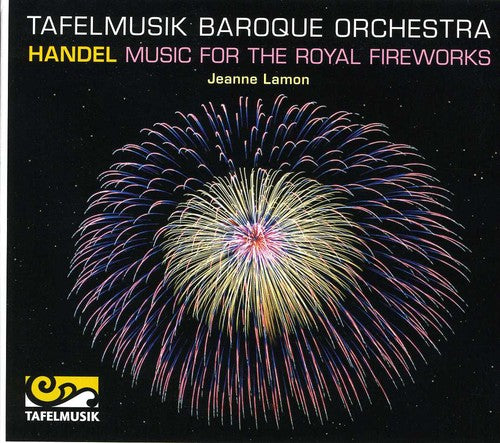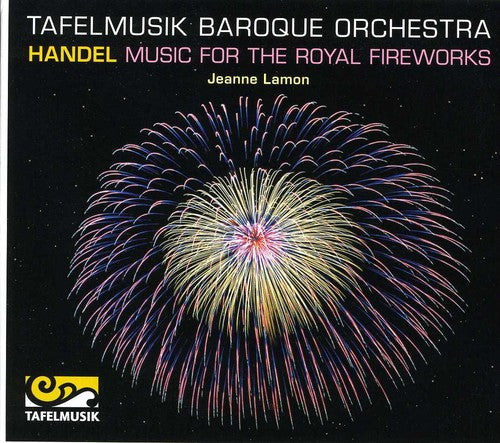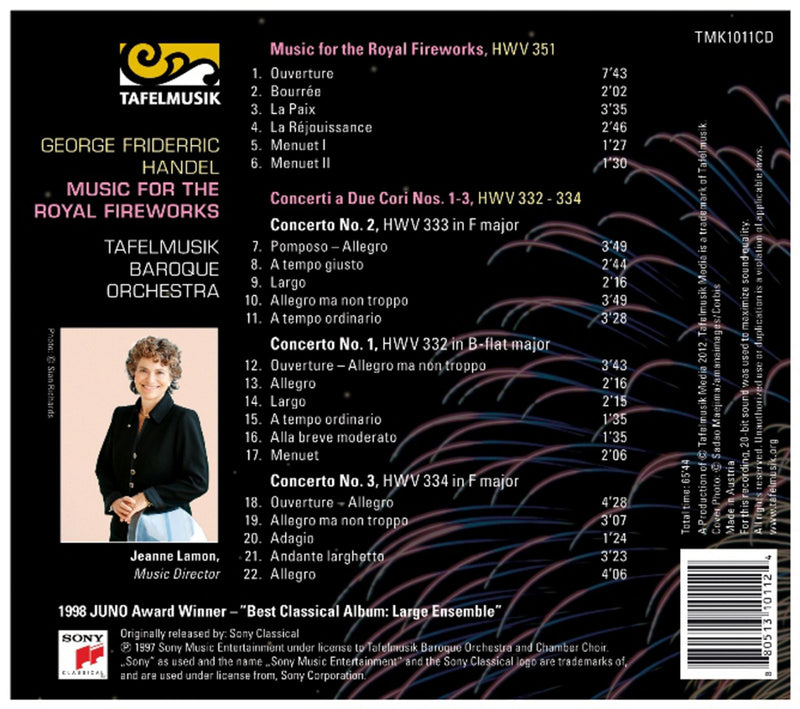George Frideric Handel
495 products
-
![Handel: Saul / Purves, Davies, Bolton [Blu-ray]](//arkivmusic.com/cdn/shop/files/3387114.jpg?v=1765569051&width=800) {# optional: put hover video/second image here positioned absolute; inset:0 #}
Opus Arte
{# optional: put hover video/second image here positioned absolute; inset:0 #}
Opus ArteHandel: Saul / Purves, Davies, Bolton [Blu-ray]
This Blu-ray Disc is only playable on Blu-ray Disc players and not compatible with standard DVD players. Handel’s oratorio Saul is taken...
-
 {# optional: put hover video/second image here positioned absolute; inset:0 #}
Opus Arte
{# optional: put hover video/second image here positioned absolute; inset:0 #}
Opus ArteHandel: Saul / Purves, Davies, Bolton
Handel’s oratorio Saul is taken from the First Book of Samuel, and focuses on the first king of Israel’s relationship with David,...
-
 {# optional: put hover video/second image here positioned absolute; inset:0 #}
Coro
{# optional: put hover video/second image here positioned absolute; inset:0 #}
CoroHandel: Saul / Connolly, Purves, Murray, Atherton, Christophers, The Sixteen
HANDEL Saul • Harry Christophers, cond; Christopher Purves (Saul); Sarah Connolly (David); Robert Murray (Jonathan) • CORO COR16103 (3 CDs: 162:39) A...
-
 {# optional: put hover video/second image here positioned absolute; inset:0 #}
Coro
{# optional: put hover video/second image here positioned absolute; inset:0 #}
CoroHandel: Samson / Christophers, The Sixteen
A good modern recording of Samson is overdue. It is extraordinary that this fine work, composed within weeks of Messiah, and in...
-
 {# optional: put hover video/second image here positioned absolute; inset:0 #}
Carus
{# optional: put hover video/second image here positioned absolute; inset:0 #}
CarusHandel: Samson / Daneman, Gottwald, Slattery, Mcgegan
This is a hybrid Super Audio CD playable on both regular and Super Audio CD players. Carus is building a valuable stable...
-
 {# optional: put hover video/second image here positioned absolute; inset:0 #}
Andromeda
{# optional: put hover video/second image here positioned absolute; inset:0 #}
AndromedaHandel: Rodelinda / Farncombe, Sutherland, Baker, Elkins, Kern
Classical Music
-
 {# optional: put hover video/second image here positioned absolute; inset:0 #}
Opus Arte
{# optional: put hover video/second image here positioned absolute; inset:0 #}
Opus ArteHandel: Rinaldo / Prina, Mead, Fritsch, Rae, Abrahamyan, Dantone
Also available on Blu-ray George Frideric Handel RINALDO Skin-tight rubber and lacrosse sticks bring contemporary chic to this timeless fantasy of warriors...
-
 {# optional: put hover video/second image here positioned absolute; inset:0 #}
Linn Records
{# optional: put hover video/second image here positioned absolute; inset:0 #}
Linn RecordsHandel: Recorder Sonatas / Pamela Thorby, Richard Egarr
This is a hybrid Super Audio CD playable on both regular and Super Audio CD players.All tracks have been digitally mastered using...
-
 {# optional: put hover video/second image here positioned absolute; inset:0 #}
On Sale
{# optional: put hover video/second image here positioned absolute; inset:0 #}
On Sale -
 {# optional: put hover video/second image here positioned absolute; inset:0 #}
On SaleSony Masterworks
{# optional: put hover video/second image here positioned absolute; inset:0 #}
On SaleSony MasterworksHandel: Partenope / Kuijken, Jacobs, Laki, La Petite Bande
Elsewhere in this issue, in choosing the records of the year, I have singled Out the new version of Handel's opera Admeto...
-
 {# optional: put hover video/second image here positioned absolute; inset:0 #}
PENTATONE
{# optional: put hover video/second image here positioned absolute; inset:0 #}
PENTATONEHandel: Organ Concertos Vol 4 / Schröder, Chorzempa
This is a hybrid Super Audio CD playable on both regular and Super Audio CD players. "The performances of these concertos share...
-
 {# optional: put hover video/second image here positioned absolute; inset:0 #}
PENTATONE
{# optional: put hover video/second image here positioned absolute; inset:0 #}
PENTATONEHandel: Organ Concertos Vol 1 / Chorzempa, Schröder, Et Al
This selection is a Hybrid Multichannel Super Audio CD. The Stereo HybridSACD program can be played on any standard compact disc player....
-
 {# optional: put hover video/second image here positioned absolute; inset:0 #}
Naxos
{# optional: put hover video/second image here positioned absolute; inset:0 #}
NaxosHandel: Ode For St. Cecilia's Day / Helbich, Mields, Et Al
HANDEL: Ode for St. Cecilia's Day
-
 {# optional: put hover video/second image here positioned absolute; inset:0 #}
Tafelmusik
{# optional: put hover video/second image here positioned absolute; inset:0 #}
TafelmusikHandel: Music for the Royal Fireworks / Lamon, Tafelmusik Baroque Orchestra
REVIEW:Thankfully, as presented here by the Tafelmusik Baroque Orchestra, this is no one-to-a-part, minimalist realization. I should probably have mentioned well before...
-
 {# optional: put hover video/second image here positioned absolute; inset:0 #}
Haenssler Classic
{# optional: put hover video/second image here positioned absolute; inset:0 #}
Haenssler ClassicHandel/Mozart: Messiah (In German) / Rilling, Stuttgart Bach Collegium
"...one would have to be extremely inflexible not to find Mozart's tinkering fascinating on its own terms. Those terms include a German...




![Handel: Saul / Purves, Davies, Bolton [Blu-ray]](http://arkivmusic.com/cdn/shop/files/3387114.jpg?v=1765569051&width=800) {# optional: put hover video/second image here positioned absolute; inset:0 #}
{# optional: put hover video/second image here positioned absolute; inset:0 #}

 {# optional: put hover video/second image here positioned absolute; inset:0 #}
{# optional: put hover video/second image here positioned absolute; inset:0 #}

 {# optional: put hover video/second image here positioned absolute; inset:0 #}
{# optional: put hover video/second image here positioned absolute; inset:0 #}

 {# optional: put hover video/second image here positioned absolute; inset:0 #}
{# optional: put hover video/second image here positioned absolute; inset:0 #}


 {# optional: put hover video/second image here positioned absolute; inset:0 #}
{# optional: put hover video/second image here positioned absolute; inset:0 #}

 {# optional: put hover video/second image here positioned absolute; inset:0 #}
{# optional: put hover video/second image here positioned absolute; inset:0 #}


 {# optional: put hover video/second image here positioned absolute; inset:0 #}
{# optional: put hover video/second image here positioned absolute; inset:0 #}

 {# optional: put hover video/second image here positioned absolute; inset:0 #}
{# optional: put hover video/second image here positioned absolute; inset:0 #}

 {# optional: put hover video/second image here positioned absolute; inset:0 #}
{# optional: put hover video/second image here positioned absolute; inset:0 #}


 {# optional: put hover video/second image here positioned absolute; inset:0 #}
{# optional: put hover video/second image here positioned absolute; inset:0 #}

 {# optional: put hover video/second image here positioned absolute; inset:0 #}
{# optional: put hover video/second image here positioned absolute; inset:0 #}

 {# optional: put hover video/second image here positioned absolute; inset:0 #}
{# optional: put hover video/second image here positioned absolute; inset:0 #}

 {# optional: put hover video/second image here positioned absolute; inset:0 #}
{# optional: put hover video/second image here positioned absolute; inset:0 #}


 {# optional: put hover video/second image here positioned absolute; inset:0 #}
{# optional: put hover video/second image here positioned absolute; inset:0 #}


 {# optional: put hover video/second image here positioned absolute; inset:0 #}
{# optional: put hover video/second image here positioned absolute; inset:0 #}